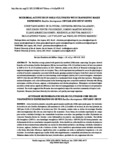Use este identificador para citar ou linkar para este item:
http://www.alice.cnptia.embrapa.br/alice/handle/doc/1049248| Título: | Microbial activities in soils cultivated with transgenic maize expressing Bacillus thuringiensis Cry1 Ab and Cry1 F genes. |
| Autoria: | OLIVEIRA-PAIVA, C. A.  CALAZANS, G. M.   FIGUEIREDO, J. E. F.   MENDES, S. M.   GOMES, E. A.   MARUCCI, R. C.   VIANA, P. A.   SELDIN, L.   MARRIEL, I. E.   |
| Afiliação: | CHRISTIANE ABREU DE OLIVEIRA PAIVA, CNPMS GIOVANNA MOURA CALAZANS, UNIFEMM JOSE EDSON FONTES FIGUEIREDO, CNPMS SIMONE MARTINS MENDES, CNPMS ELIANE APARECIDA GOMES, CNPMS ROSÂNGELA CRISTINA MARUCCI, UFLA PAULO AFONSO VIANA, CNPMS LUCY SELDIN, UFRJ IVANILDO EVODIO MARRIEL, CNPMS. |
| Ano de publicação: | 2015 |
| Referência: | Revista Brasileira de Milho e Sorgo, Sete Lagoas, v. 14, n. 3, p. 409-419, 2015. |
| Conteúdo: | ABSTRACT: The Brazilian acreage planted with genetically modified (GM) maize expressing Cry genes derived from the soil bacterium Bacillus thuringiensis (Bt) has increased from 4.9% (5.0 million hectares) of total area planted in 2009 to 81.4 % (15.83 million hectares) in 2014. However, studies on the effects of Bt-maize technology on non-target microorganisms in tropical soils are incipient. Thus, a field experiment was performed to assess the physiological activity of bacterial communities associated with Bt-maize genotypes planted in tropical Dark Red Latosol of Cerrado and lowland hydromorphic soil with localized flooding. A non-transgenic hybrid (30F35) and its transgenic counterparts 30F35Y (Cry1Ab) and 30F35H (Cry1F) were planted in a randomized block design with four replicates. Rhizosphere and non-rhizosphere soils collected from plants in the flowering stage were assayed for metabolic diversity with Biolog and enzyme activities of urease, arginase, acid phosphatase and alkaline phosphatase. Rhizosphere soil showed higher microbial activity and no significant differences were detected among genotypes in all the biochemical soil parameters evaluated. The results suggested that Bt-maize does not negatively impact the microbial community of tropical soils. RESUMO: A área brasileira plantada com milho geneticamente modificado (GM) expressando genes Cry derivados da bactéria do solo Bacillus thuringiensis (Bt) aumentou de 4,9% (5,0 milhões de hectares) da área total plantada em 2009 para 81,4% (15,83 milhões de hectares) em 2014. No entanto, estudos sobre os efeitos da tecnologia Bt-milho sobre microrganismos não alvo em solos tropicais são incipientes. Dessa forma, foi realizado experimento de campo para avaliar a atividade fisiológica das comunidades bacterianas associadas com genótipos de milho Bt plantados em Latossolo Vermelho Escuro do Cerrado e solos hidromórficos da planície com inundações localizadas. Um híbrido não transgênico (30F35) e seus homólogos transgênicos 30F35Y (Cry1Ab) e 30F35H (Cry1F) foram plantados com delineamento de blocos casualizados com quatro repetições. Solos rizosféricos e não rizosféricos coletados de plantas no estádio de florescimento foram submetidos aos ensaios de diversidade metabólica com Biolog e atividades enzimáticas de urease, arginase, fosfatase ácida e fosfatase alcalina. Solos rizosféricos apresentaram maior atividade microbiana e não foram detectadas diferenças significativas entre os genótipos em todos os parâmetros bioquímicos e de solo avaliados. Os resultados sugerem que o milho Bt não afeta negativamente a comunidade microbiana dos solos tropicais. |
| Palavras-chave: | Diversidade funciona Milho Bt Bioindicador Qualidade do solo Organismo não alvo |
| Digital Object Identifier: | 10.18512/1980-6477/rbms.v14n3p409-419 |
| Tipo do material: | Artigo de periódico |
| Acesso: | openAccess |
| Aparece nas coleções: | Artigo em periódico indexado (CNPMS)  |
Arquivos associados a este item:
| Arquivo | Descrição | Tamanho | Formato | |
|---|---|---|---|---|
| Microbialactivities.pdf | 472,98 kB | Adobe PDF |  Visualizar/Abrir |









